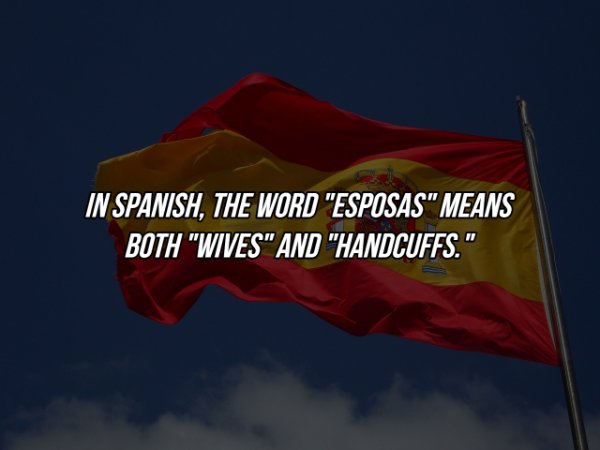The spanish word esposa means wife the plural esposas also means handcuffs

The Spanish word esposa means “wife.” The plural, esposas, also means “handcuffs”.

In the Spanish language, certain words can have multiple meanings, creating interesting linguistic nuances. One such example is the word “esposa.” While it primarily translates to “wife,” it also has an intriguing alternative meaning - “handcuffs” - when used in the plural form “esposas.” This dual meaning may give rise to confusion or evoke curiosity among language learners and those interested in cultural peculiarities.
The primary meaning of “esposa” as “wife” is derived from its Latin root, “sponsa,” which signifies a woman who is married or engaged to be married. This familiar interpretation aligns with its general usage in conversations, writings, and literature among Spanish-speaking communities worldwide.
On the other hand, the secondary meaning of “esposas” as “handcuffs” adds an unexpected layer of complexity. This usage originated from the idea that in marriage, one person is “bound” to the other, similar to how handcuffs restrict freedom of movement. Over time, this metaphorical connection between marital bonds and literal restraints influenced the evolution of the word in certain contexts.

Understanding the dual meaning of “esposa/esposas” is not merely an intriguing linguistic observation but also offers insights into the Spanish language’s rich history and culture. It serves as a reminder that words can carry diverse connotations and may vary depending on the context of their usage.
Exploring word intricacies and cultural variations within a language is an essential aspect of language learning and intercultural communication. Admittedly, such linguistic peculiarities can pose challenges for non-native speakers who may encounter difficulties in accurately understanding and employing these words without proper context.
To delve deeper into the meaning and usage of “esposa/esposas,” one can visit SpanishDict’s comprehensive online dictionary. The platform provides detailed translations, examples, and associated phrases to ensure learners and enthusiasts have a clear understanding of the word’s multiple interpretations and can navigate its usage with confidence.
In conclusion, the Spanish word “esposa” primarily means “wife,” while its plural form, “esposas,” also carries the alternative meaning of “handcuffs.” This duality showcases the versatility and complexity of language, underscoring the need for contextual understanding to grasp the nuances of certain words fully.
Related Posts
Quick Links
Legal Stuff

